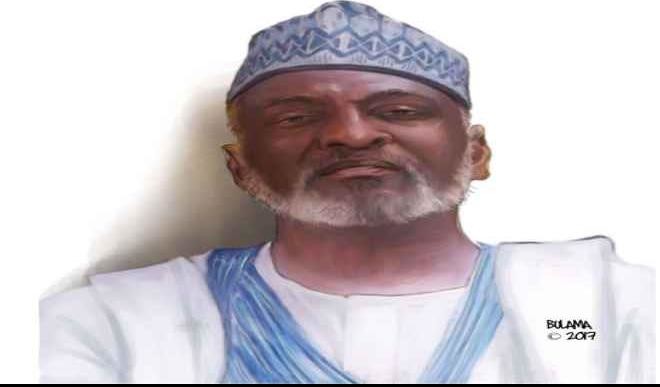Alhaji Garba Buwai: Two years without his mentorship
My first encounter with Alhaji Garba Buwai was in January 2007, when he was posted to the Police Service Commission as Permanent Secretary, and by extension, the Secretary to the Commission. By the time he was re-deployed in December 2009, after being the second longest serving secretary to the Commission after Alhaji Ahidjo Bamaga, I […]


My first encounter with Alhaji Garba Buwai was in January 2007, when he was posted to the Police Service Commission as Permanent Secretary, and by extension, the Secretary to the Commission. By the time he was re-deployed in December 2009, after being the second longest serving secretary to the Commission after Alhaji Ahidjo Bamaga, I had a composite picture of him as a courageous, astute and skilful administrator who was tenacious in adhering to rules.
He was warm with an infectious sense of humour, yet principled. On one occasion, the staff jokingly asked him why he appeared to have an almost adulatory difference for women. He said, “why not? I like women because my mother is a woman”.
Alhaji Buwai came to the Commission when its board was not in place, the board having exited by effluxion of time on November 21, 2006. He therefore ran the Commission as an unofficially designated sole administrator from January 2007 to April 14, 2008 when the next board was inaugurated. In the tempestuous nature of the Commission’s relationship with the Nigeria Police Force, the daunting task of handling the personnel affairs of the Nigeria Police Force fell on him. Alhaji Buwai navigated the waters with uncommon confidence acquired through experience, which he garnered from all the places he had served. He acquitted himself creditably. The staff still recall his era with nostalgic feelings.
The duty of the board is to formulate policies for the implementation of the staff. But with the absence of the board, Alhaji Buwai kept the staff busy. He took many sensitive decisions for the ratification of the board when inaugurated. In the discharge of his duties, he tapped into the expertise of Directors and Heads of Departments and Units. As Legal Adviser, it was my duty to guide him on legal issues. He handled government resources with a sense of duty and responsibility. He kept to his expenditure limits, returning almost two hundred million naira to chest in December 2008. Nevertheless, he did not withhold staff legitimate entitlements. It was his saying that he would rather be known as a Permanent Secretary who never spent money in violation of financial regulations than be the one who doled out government money to staff to make them happy. According to him, the same staff would in their unguarded moments claim that he shared money to them. Civil Servants, he said, are their own enemies.
On a deeper reflection, I agree with him. Such wasteful spending is an aspect of corruption, which we all clamour, should be eliminated. In addition, given his religious devotion, it would be against God’s injunction to embark on such expenditure.
Alhaji Garba Buwai was always mindful of his eventual return to his creator. In addition to his Civil Service assignments, he never shirked his religious duties and obligations. That is how it should be, for Allah S.W.T did not create us to come to the world to work for our living. Rather he created us to work for our livelihood to enable us perform our primary duty: to worship Him. He proclaims in Quran Chapter 52 verses 55-56: “And remind, for indeed, the reminder benefits the believers. And I did not create the jinn and mankind except to worship Me”.
Alhaji Buwai adhered to these injunctions with tenacity. His practice of observing the Monday and Thursday voluntary fasting revived my zeal in the practice. Not only did he perform the obligatory pillars of Islam, he embarked on voluntary ones. One day, I went to his house to break my Thursday fast. Our discussion turned on social lives, which are almost out of control. He admonished me to keep to my religious obligations. He said that making allowances for sleep and eating, I should be constantly doing Dhikr (Remembrance of Allah).
Death is inevitable, we all know. However, as humans, sometimes we get so lost in worldly affairs that we forget this truism. Garba Buwai did not appear to be so lost. On the days he did not fast, he would close from work and head straight to the National Mosque, where he would observe both the early and late evening prayers of Maghrib and Ishai before going home for dinner and retire for the night. And on the days he fasted, he would break it in the midst of brothers. His house was always a beehive and none left without having his fill.
After he left the Police Service Commission, we kept the relationship. He became my mentor; he cared for me, he bothered about my welfare and career, in addition to admonishing me not to make worldly matters the centre of my concern but to constantly remember that one day we would leave this world. I believed him because he lived by example. He went to the Lesser Hajj at every available opportunity. He spent his last Ramadan entirely in Saudi Arabia.
Alhaji Garba Buwai died in a motor accident on October 4, 2015 on his way to the house after observing his Ishai prayer at the National Mosque, Abuja. He died on active service, as he was still a member of the Federal Civil Service Commission. His death left a void in my life.
He was not a saint but he never allowed any opportunity to worship his Creator slip by. He lived a life worthy of emulation. While praying Allah SWT to grant Alhaji Garba Buwai Aljanah Firdaus, may He also give those he left behind the fortitude to bear the irreparable loss, Amen.
Mohammed, the Director Legal Services of the Police Service Commission, wrote from Abuja.
